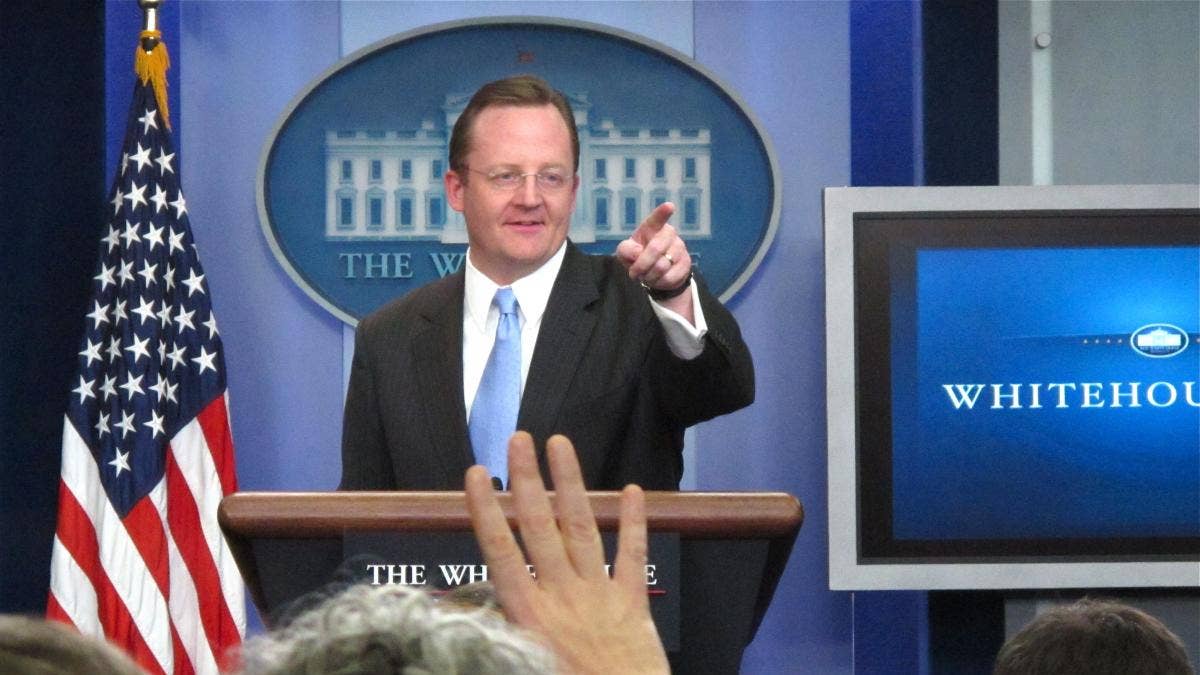
Press Secretary Robert Gibbs takes questions during the White House briefing on Wednesday, January 5th. (Fox News Photo)
With the announcement that White House press secretary Robert Gibbs will soon step down from his post, the big question in Washington is who will take his place?
President Obama's choice could potentially send a potent message about the direction he plans to take over the next two years. And recent White House history may offer the president some guidance on what kind of replacement he should be seeking for Gibbs.
When President Bill Clinton's first press secretary, Dee Dee Myers, left the post in 1995, Clinton was faced with a similar situation - a departing spokesperson and a Congress newly controlled by the opposing party.
Clinton surprised some in the beltway by bringing in Mike McCurry. At the time, McCurry was a spokesman for the State Department, but didn't have a particularly long or close relationship with the president, unlike Myers and George Stephanopoulos, a campaign operative and presidential advisor who also held frequent press briefings.
By bringing in McCurry, the Clinton administration was able to have its message delivered from the podium by someone who wasn't considered a Clinton loyalist. During the turmoil of sex scandals and impeachment of Clinton for lying under oath that followed, McCurry's outsider status helped him maintain credibility with press corps.
Some White House watchers suggest that Obama might similarly benefit from an outside voice.
Gibbs has been involved with Obama's team since 2004, when he joined the then-legislator's campaign for Senate. Gibbs has received mixed reviews for his two-year tenure behind the White House podium - he's been commended for running a tight ship in the press office, but also leaves, as Chris Stirewalt writes in today's Power Play "a tenure marked by having sometimes said too much ("professional left," "Republican cabal," "no doubt" that Democrats could lose the House, etc.) and for bringing sarcasm to full flower in the briefing room."
Possible replacements for Gibbs within the administration include Bill Burton, the current deputy press secretary in the White House, and Jay Carney, the communications director for Vice President Biden.
But the administration could also choose a candidate outside the tight circle of White House advisors - an unexpected pick in the McCurry mold.
The choice has the potential to send a potent message to the press and to the public. By his own admission, the Obama administration has had trouble communicating its message effectively, and now faces a new Republican majority in the House.
By choosing an outsider, Obama could bring a fresh perspective to the podium, and perhaps build his credibility by bringing on someone who isn't a longtime loyalist to Obama and his staff.
"Picking someone outside of his comfort zone who has high credibility with the media would send a message that President Obama gets that White House operations have to change quickly with the new political landscape," says Ron Bonjean, the former communications director for Speaker Dennis Hastert, who also headed communications at the Commerce Department under President George W. Bush. "Having Bill Daley as a new chief of staff is good first step, but hiring an outsider would be more convincing to many."
On the other hand, reaching outside the tight circle of advisors within the White House could send the message that Obama is unhappy with his current team, and may undermine him in the end.
"If Obama taps Gibbs' deputy, Bill Burton, or someone else from his team, it would be a sign of trust and appreciation," writes Stirewalt (link). "If Obama goes outside of Gibbs' communications shop, it would be a sign of dissatisfaction."
But for all the Beltway speculation on the person behind the podium, the experts say it's still only a sideshow.
"What really matters is what Obama does on policy, more than staffing changes," says Bonjean. "If he doesn't choose policies that help the grow jobs and the economy, he will still have an uphill battle in 2012."




